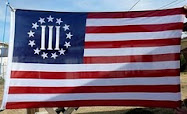Thanks again to Bill St Clair at http://billstclair.com/blog/ for the heads up on this.
Thomas L. Knapp at Center for a Stateless Society - a comparison of public and private organized crime, the government vs. the mafia. Conclusion: they're pretty much the same thing, except government's crimes are much larger, and the mafia doesn't try to convince you that their criminal activities are for your own good.
Play the government lottery, you’re an upstanding citizen. Put $50 on your neighborhood numbers game — or worse, help set up that game — you’re a crook.
Give a pimp or madam a hundred bucks for an hour with one of his escorts, you’re a john. Pay the county clerk $50 for a “marriage license” and keep up with the attendant annual tax penalties, have all the sex you want for life — it’s “legit.”
Buy or sell an oxycodone tablet on the street, you’re a “drug dealer” or a “substance abuser.” Get a license from the DEA to sell, or a prescription from a doctor to buy, that same pill and you’re a “pharmacist” or a “patient.”
Pressure a jury to acquit your associate, you’re a “mobster” engaged in “jury tampering.” Pressure a jury to convict your opponent, you’re a “prosecutor” making good use of “voir dire.”
He goes on to make certain predictions that we in our time see as coming true.
The historical method, moreover, establishes the important fact that, as in the case of tabetic or parasitic diseases, the depletion of social power by the State can not be checked after a certain point of progress is passed. History does not show an instance where, once beyond this point, this depletion has not ended in a complete and permanent collapse. In some cases, disintegration is slow and painful. Death set its mark on Rome at the end of the second century, but she dragged out a pitiable existence for some time after the Antonines. Athens, on the other hand, collapsed quickly... Of two things, however, we may be certain; the first is, that the rate of America's approach to that point is being prodigiously accelerated; and the second is, that there is no evidence of any disposition to retard it, or any intelligent apprehension of the danger which that acceleration betokens...
Closer centralization;
a steadily growing bureaucracy;
State power and faith in State power increasing, social power and faith in social power diminishing;
the State absorbing a continually larger proportion of the national income;
production languishing, the State in consequence taking over one "essential industry" after another, managing them with ever-increasing corruption, inefficiency and prodigality, and finally resorting to a system of forced labour.
Then at some point in this progress, a collision of State interests, at least as general as that which occurred in 1914, will result in an industrial and financial dislocation too severe for the asthenic social structure to bear; and from this the State will be left to "the rusty death of machinery," and the casual anonymous forces of dissolution will be supreme."
The inevitability of the corruption of The State is Natural Law. The inevitability of the demise of The State is Natural Law as well. What is NOT Natural Law is WHEN these happen. It is a certainty that America's political existence will fade. However, the question for every generation is "Will it happen in my lifetime?" Will America languish in years of internal tyranny or will it be an abrupt end? The answer is with what course each generation en-mass does. That course is determined by what influences are dominant and successful in directing the generational course.
Therefore, I ask these questions for reflection and if required, action.
What are the forces influencing American society today?
Are these forces absolute in their influence?
If one had a better idea of how American social power should be directed, how would you influence the American public effectively to go that way?
What method of influence has historically been more successful?
What if your ideas were directly in opposition to the State's direction?
If the State is corrupt and no different than "organized crime" how do you "work within the system to fix the system?"
To who or what do you appeal to for justice and remedy?
By what non-violent methods were the colonists successful in obtaining their liberty from Britain?
By what violent methods were the colonists successful in obtaining their liberty from Britain?
Is there a way to influence society en-mass without resorting to violence?
Has it actually been done by those in opposition to the State?
Why not?
Within the previous is the dilemma of the American "Liberty Movement." Solve or reduce the problem of factionalism and then the influence over the social power of the public can be addressed and accomplished. The battle is always over the hearts and minds of John Q. Public and his family. Who or what they believe and support has always been where the real battle is. The People have always outnumbered their "leaders." It is what they do or don't do that determines the course for their generation. Statism is NOT inevitable in any generation unless that generation accepts it. Whether they accept it or not is up to the capable influence of the liberty visionaries within that generation to to speak to them on their level and not from some erudite ivory tower of rhetorical theory constructed to maintain a "not-for-profit" status.
























